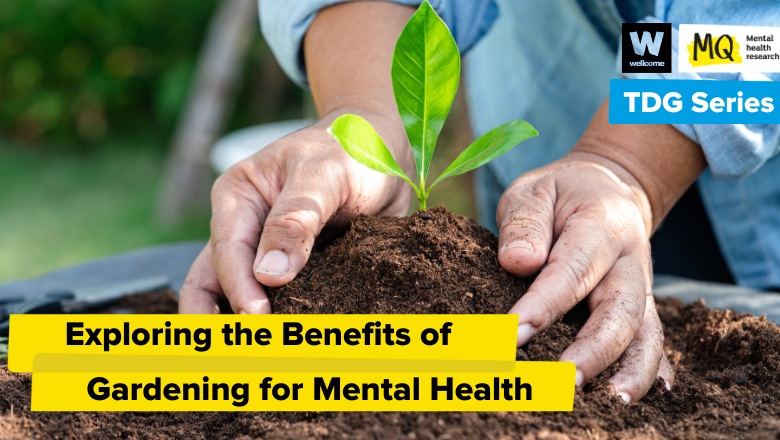In 2024, MQ Mental Health Research Seizes a Unique Opportunity to Innovate Mental Health Science
Developed and funded by Wellcome, this initiative is designed to empower researchers beyond the traditional fields of psychiatry, psychology, and neuroscience. By encouraging the implementation of innovative and unconventional ideas from various disciplines, this Transdisciplinary Research Grant series aims to uncover groundbreaking insights that could transform mental health interventions. Throughout this series, we will delve into each study and elucidate the significance of their findings for advancing mental health treatment strategies.
Gardening, often perceived merely as a leisure activity, is emerging as a significant player in mental health therapy. Social and Therapeutic Horticulture (STH) is a therapeutic approach that utilizes engaging gardening tasks—such as planting seeds, potting, digging, and weeding—to assist individuals in managing symptoms associated with depression and anxiety. This innovative therapy harnesses the healing power of nature, offering a holistic method for improving mental well-being.
Dr. Carly Wood and her research team at the University of Essex conducted a comprehensive investigation into the effectiveness of STH in promoting mental health. Their study aimed to identify the specific benefits of gardening as a therapeutic tool and to evaluate why it is becoming an increasingly appealing option for mental health treatment.
Exploring the Research: How Gardening Impacts Mental Health
The research review comprised 17 distinct studies, encompassing a total of 879 participants. The primary focus was on assessing the impact of gardening on symptoms of depression and anxiety. The research settings varied; some sessions took place indoors, others outdoors, while a few utilized a combination of both environments. The duration of these activities ranged from brief sessions lasting 30-40 minutes to extended periods of up to 3.5 hours. Participants engaged in the gardening sessions anywhere from once a week to five times a week, over a span of four to sixteen weeks, providing a comprehensive view of the therapy’s effects.
To accurately assess the effectiveness of STH, the studies drew comparisons with other treatment modalities, such as routine medical care and everyday activities. In several instances, researchers evaluated the changes in levels of depression or anxiety experienced by participants during the gardening sessions.
Key Findings: The Positive Impact of Gardening Therapy
Dr. Wood’s research team discovered that individuals who participated in STH reported notable reductions in feelings of depression and anxiety compared to those in alternative treatment groups. The findings indicated significant improvements in depression symptoms, while anxiety showed moderate enhancements. Even in studies lacking comparison groups, many participants noted substantial progress by the conclusion of the gardening program, underscoring the potential efficacy of this therapeutic approach.
However, it’s essential to note that the results varied among the studies, with some exhibiting more pronounced improvements than others. Challenges arose within the research methodology, such as infrequent follow-ups with participants and limited sample sizes, complicating the ability to draw definitive conclusions regarding the overall effectiveness of STH.
The Importance of Gardening Therapy for Mental Well-Being
This research underscores the notion that gardening transcends mere plant cultivation—it can significantly foster improved mental health. Social and Therapeutic Horticulture holds considerable promise for individuals grappling with a combination of physical, mental, and social difficulties. By integrating gentle physical activity with a profound connection to nature and fostering structured social interactions, STH provides a distinctive approach to enhancing overall well-being.
Future Directions: Advancing Research on Gardening Therapy
While the preliminary findings are encouraging, additional research is crucial to fully comprehend the potential of STH as a therapeutic option. Future investigations should directly compare gardening therapy with established treatments for depression and anxiety, such as medication and psychotherapy. Conducting high-quality research will facilitate the integration of STH into standard mental health care practices, making it more widely accessible to those in need.
Should this occur, gardening could evolve into a common component of routine mental health treatments, empowering individuals to take charge of their recovery, potentially minimizing the risk of relapse, and alleviating the burden on mental health services, including the NHS.
Envisioning a Holistic Approach to Mental Health Care
At its essence, this endeavor aims to provide people with a broader spectrum of options for managing their mental health effectively. Social and Therapeutic Horticulture could revolutionize mental health treatment, particularly for those who find traditional therapies daunting or prefer more hands-on methods. With further exploration and support, gardening might emerge as a critical component of comprehensive mental health care.
!function(f,b,e,v,n,t,s)
if(f.fbq)return;n=f.fbq=function()n.callMethod?
n.callMethod.apply(n,arguments):n.queue.push(arguments);
if(!f._fbq)f._fbq=n;n.push=n;n.loaded=!0;n.version=’2.0′;
n.queue=[];t=b.createElement(e);t.async=!0;
t.src=v;s=b.getElementsByTagName(e)[0];
s.parentNode.insertBefore(t,s)(window, document,’script’,
‘https://connect.facebook.net/en_US/fbevents.js’);
fbq(‘init’, ‘177421805922935’);
fbq(‘track’, ‘PageView’);












